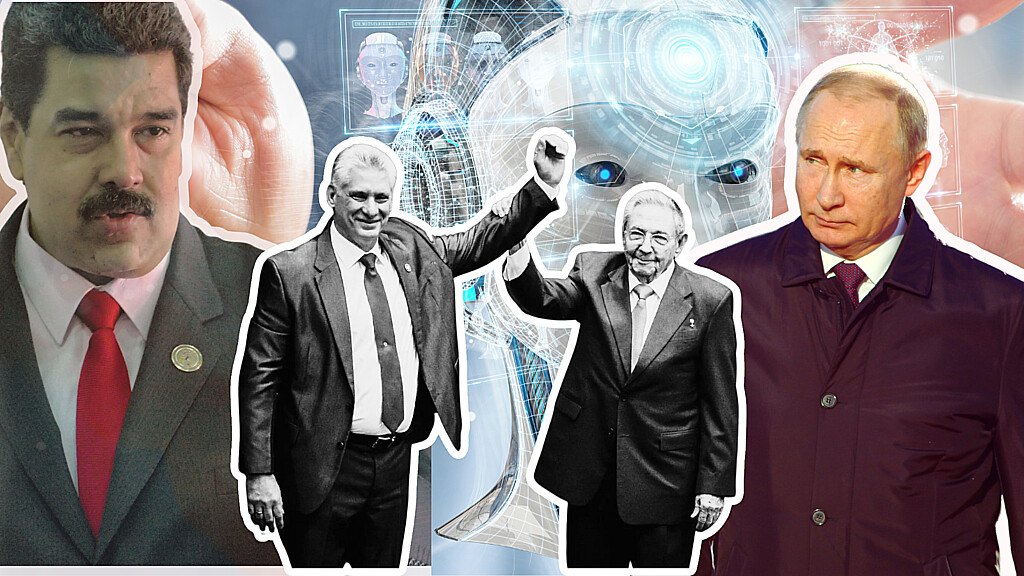Opinion & Reviews
AI: How Venezuela's dictatorship is weaponizing artificial intelligence against human rights
Dictatorships around the world are using artificial intelligence to censor and manipulate public opinion, creating concerns about the potential dangers of AI and its impact on democracy and human rights

May 2, 2023 9:12am
Updated: May 2, 2023 9:12am
For years, thinkers, scientists, entrepreneurs, politicians, and philosophers have been warning about the benefits and dangers that artificial intelligence (AI) could bring to humanity. Several debates have arisen on this issue, one of which concerns the fact that AI could take away millions of jobs from people, while another debate arises from the control that these intelligent machines could exert over humanity in the future.
Another highly debated scenario is one in which machines could effectively replace humanity in most everyday tasks, propelling abrupt economic growth that could alleviate poverty worldwide with redistributive policies that distribute the benefits generated by these machines, which would lead to another scenario, not necessarily worse, but certainly worrying: if machines completely replace human labor and manage to feed the entire population, then what would be the philosophical incentives for humanity? What will young and old people do for the rest of their days? What will be the motivations of men and women in this new self-sustaining world?
Certainly, the issue of AI is immensely complex, it would take several books to write about, and it cannot be summarized in a single article. However, let's momentarily skip the philosophical, sociological, and economic debates to focus on an aspect that already affects the present: the use of AI by tyrannies to oppress the population and create propaganda in their favor.
Recently, the tyranny of Nicolás Maduro has acknowledged using a "star presenter" named "Sira" created with artificial intelligence with which the regime intends to broadcast its propaganda. Previously, several reports had shown how the Chavismo had started to implement artificial avatars that emitted false reports in English about non-existent economic improvements in the country.
These artificially created "journalists" appeared in videos with paid promotions on YouTube to favor the Venezuelan tyranny. These videos with Chavismo propaganda disguised as "journalistic reports" have gained thousands of views on YouTube and TikTok, and are also broadcast through the state channel "Venezolana de Televisión." This should naturally alert us to one of the greatest dangers emanating from AI. However, the use of AI for propaganda purposes is not the only way in which authoritarian regimes can exploit it to control the population.
Certainly, artificial intelligence is one of the most disruptive and rapidly developing technologies today. Its ability to analyze large amounts of data and generate predictions make it particularly attractive for governments and authoritarian regimes seeking to maximize their power and control the population.
Currently, these authoritarian regimes and some "democratic" governments could use AI for different purposes, where public manipulation is just one of its possible functions.
- Automated censorship: Dictatorships can use AI to censor online content they consider dangerous or subversive to their intentions of controlling the population. AI can use algorithms to monitor the content of social media, blogs, media outlets, and websites, identifying, restricting, and even censoring or removing any material that goes against the official discourse.
- Mass surveillance: Tyrannies can also use AI to collect and analyze large amounts of data about the population, including personal information, online activities, and public behavior, as already happens in countries like China. This would allow them to closely monitor citizens and detect any signs of dissent or threat to their regime.
- Risk profiling: Dictatorships can also use AI to create "risk" profiles for the regime, identifying those who could represent a threat to their government. These profiles could be based on factors such as age, education, work history, and family background, among others.
- Media manipulation: As we were saying, tyrannies can also use AI to manipulate public opinion and control the narrative in the media and social networks, as the regime of Nicolás Maduro has been doing in Venezuela. AI algorithms can be used to create fake content and spread it online.
In conclusion, AI will be the great point of debate for the future of civilization. The great benefits that it could bring to humanity are almost as comparable as the harm it could cause to the development of democracies, open economies, and the future of our societies.
From an ideological standpoint - in my case, favoring libertarian thought - it is a really difficult issue to address, given that restricting private initiative with government regulations has always done more harm than good. Attempting to limit a technology that could solve major problems for humanity could also be counterproductive in some way.
However, AI breaks with all the philosophical, material, and economic discussions we have had in the past. It represents an abrupt change for humanity as we know it, and is a subject that we cannot address with the ideological or political flaws of the past. Undoubtedly, it will take a lot of ink and many debates to adequately address both the positive and negative impacts of artificial intelligence on planet Earth.






